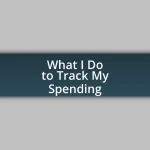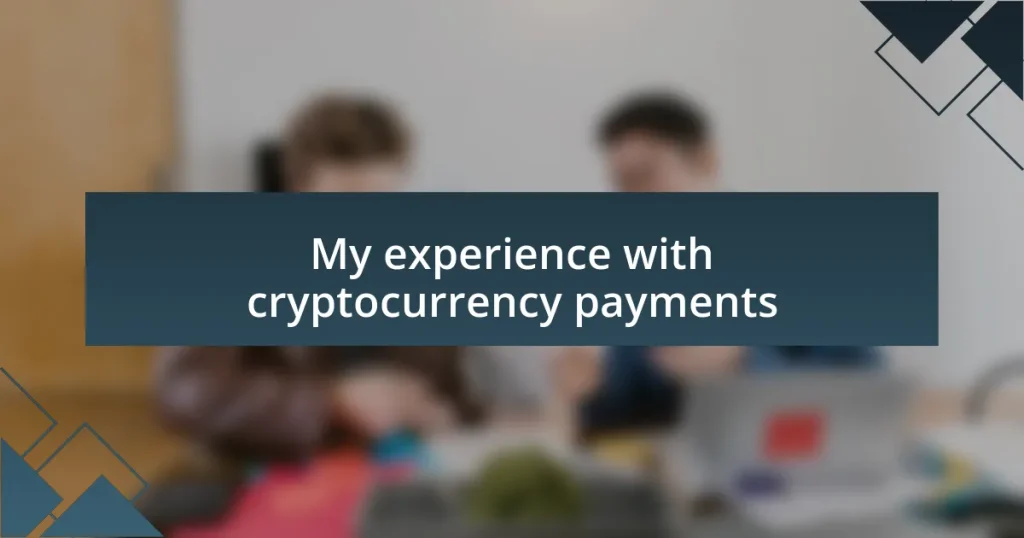Key takeaways:
- Cryptocurrency payments offer benefits like lower fees, faster transactions, and enhanced privacy, making them appealing in the digital economy.
- Setting up a cryptocurrency wallet involves choosing the right type and ensuring secure storage of backup phrases to access funds.
- Volatility poses challenges for cryptocurrency transactions, impacting earnings and complicating pricing strategies for businesses.
- Security measures such as two-factor authentication and using hardware wallets are crucial for protecting cryptocurrency holdings from potential threats.
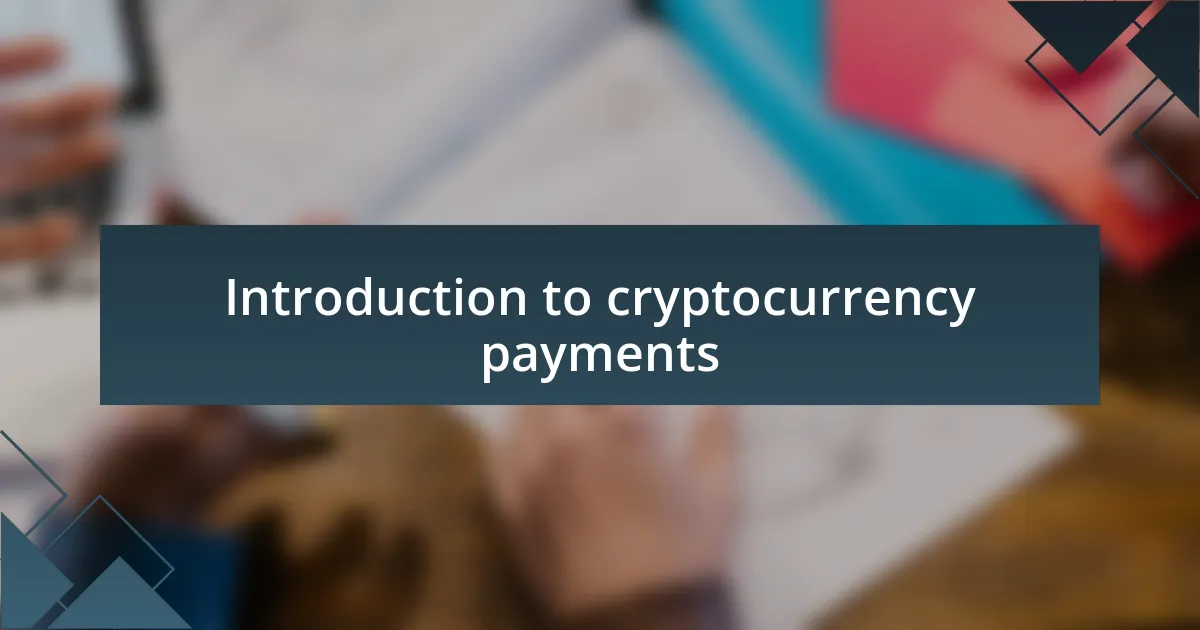
Introduction to cryptocurrency payments
Cryptocurrency payments are revolutionizing how we conduct transactions in today’s digital economy. When I first encountered Bitcoin, I was intrigued by the idea of a decentralized currency that operated outside traditional banking systems. Could this really change the way we handle our finances? As I dove deeper, it became clear that cryptocurrency offers both exciting opportunities and unique challenges.
This payment method allows for quicker transactions and lower fees, which is something I’ve experienced firsthand when purchasing products online. I remember making my first purchase with Ethereum—it felt both liberating and slightly nerve-wracking. There’s a certain thrill in knowing that my payment was processed almost instantly, without the delays typical of bank transactions.
Yet, it’s not all smooth sailing. The volatility of cryptocurrencies can be quite intimidating. I recall a moment when I hesitated to accept Bitcoin for a service I offered, worried about how its fluctuating value could affect my earnings. So, are we ready to fully embrace this new currency, or are caution and uncertainty still holding us back? These questions linger, shaping our collective journey into the world of cryptocurrency payments.
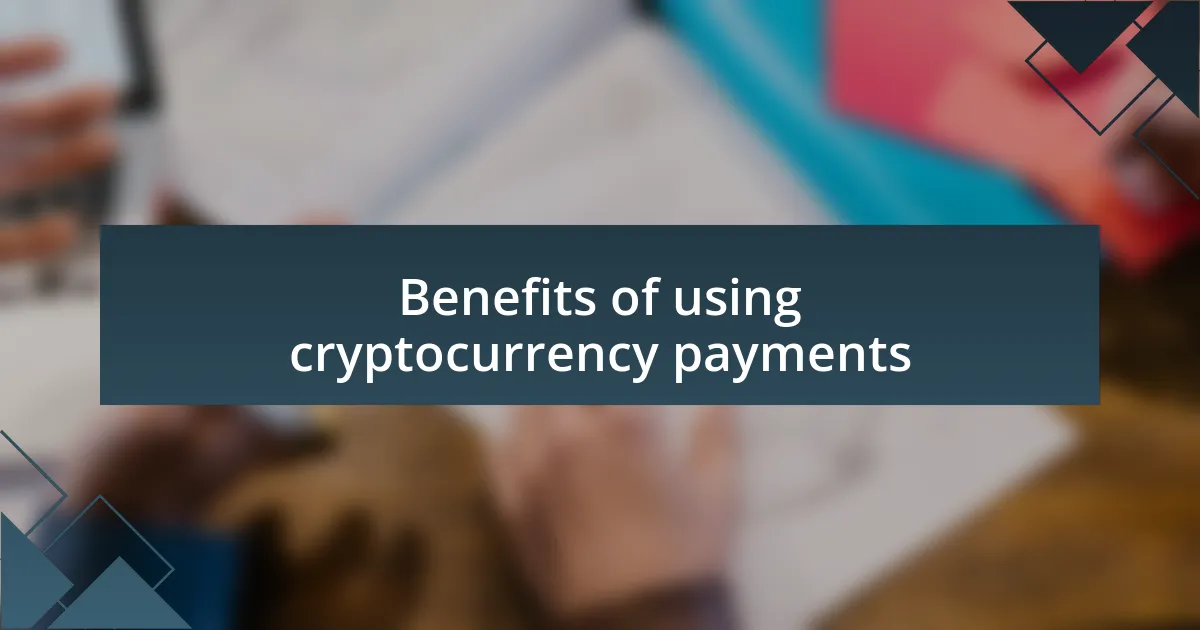
Benefits of using cryptocurrency payments
Using cryptocurrency for payments brings a wealth of advantages that I find particularly exciting. One major benefit is the potential for increased privacy. Unlike traditional payment methods, transactions made with cryptocurrencies often do not require personal information. I remember feeling a sense of relief the first time I made a purchase without having to share my credit card details. It felt empowering, knowing that my financial data remained much more secure.
Additionally, the global reach of cryptocurrency is something I truly appreciate. No matter where you are in the world, cryptocurrencies can facilitate transactions with ease. I’ve had experiences where friends overseas could pay for services without worrying about exchange rates or bank fees, which has made collaborations so much smoother. Here are some key benefits I have observed:
- Lower transaction fees typically compared to traditional banking.
- Faster transactions, particularly for international payments.
- Enhanced privacy and security, with less personal data exposed.
- Accessibility for unbanked populations, allowing more people to participate in the digital economy.
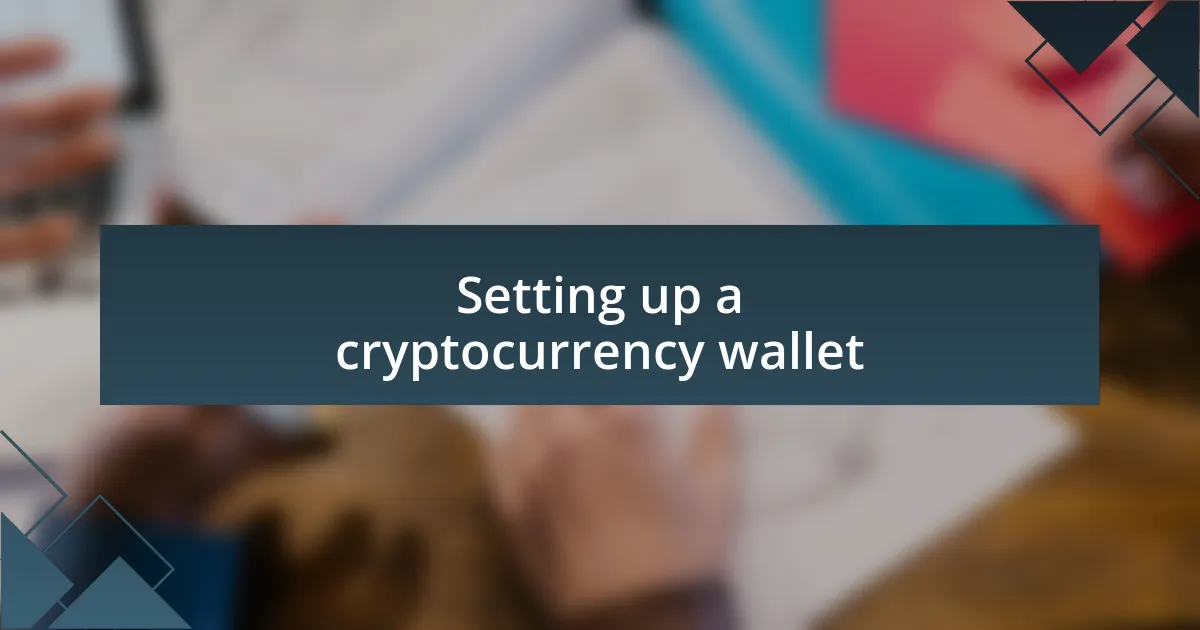
Setting up a cryptocurrency wallet
Setting up a cryptocurrency wallet is a straightforward process, but I remember feeling a mix of excitement and apprehension when I first ventured into it. The first step usually involves selecting the right wallet type, whether it’s a software wallet on your phone or a hardware wallet for added security. I chose a software wallet initially for its convenience, and I was pleasantly surprised by how user-friendly it was, making my first transactions feel seamless.
Once you pick a wallet, you’ll need to download the application or acquire the hardware. I vividly recall the thrill of being able to create my wallet; it felt like opening a door to a new financial world. During the setup, you receive a seed phrase—a series of words that act as your backup. It’s crucial to store this phrase securely because losing it means losing access to your funds. I learned the hard way to keep it stored offline, as I almost lost track of it while switching devices.
Lastly, funding your wallet is essential, and it’s where the real fun begins. I remember the rush of making my first deposit; it felt like a rite of passage into the cryptocurrency community. You can typically receive coins from exchanges or other wallets directly into yours. Organizing and understanding this step was vital, as navigating the myriad of exchange platforms can be daunting at first, but it’s worth it.
| Wallet Type | Pros |
|---|---|
| Software Wallet | User-friendly, convenient for everyday transactions |
| Hardware Wallet | Enhanced security, ideal for long-term storage |
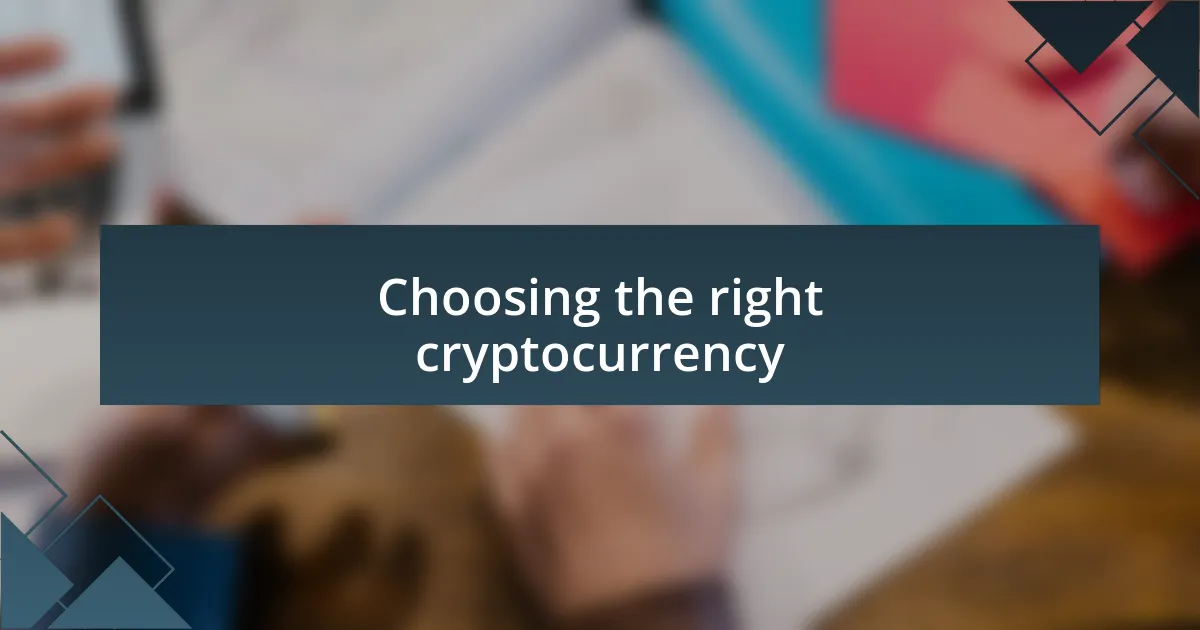
Choosing the right cryptocurrency
Choosing the right cryptocurrency can feel overwhelming with so many options available, but I found that aligning it with my goals made the decision easier. I remember browsing through various cryptocurrencies, weighing their purposes and communities. For instance, while Bitcoin is renowned for its stability and acceptance, I was drawn to Ethereum for its smart contract capabilities. What do you want to achieve with your investment?
Another factor I considered was the project’s community and backing. I recall joining online forums and discussions, immersing myself in the community to get a sense of the developers and users driving the currency’s evolution. A strong community often indicates a project’s longevity and potential, so don’t overlook this aspect when making your choice. Engaging with others can provide insights you might not discover on your own.
Finally, volatility is another aspect that can’t be ignored. My first experience with a sudden dip taught me to set clear limits and stay cool-headed. I learned the value of doing thorough research and having patience when selecting cryptocurrencies, as the market can fluctuate dramatically in short bursts. How do you plan to navigate these ups and downs? Remember, informed decisions can help you weather the storms.
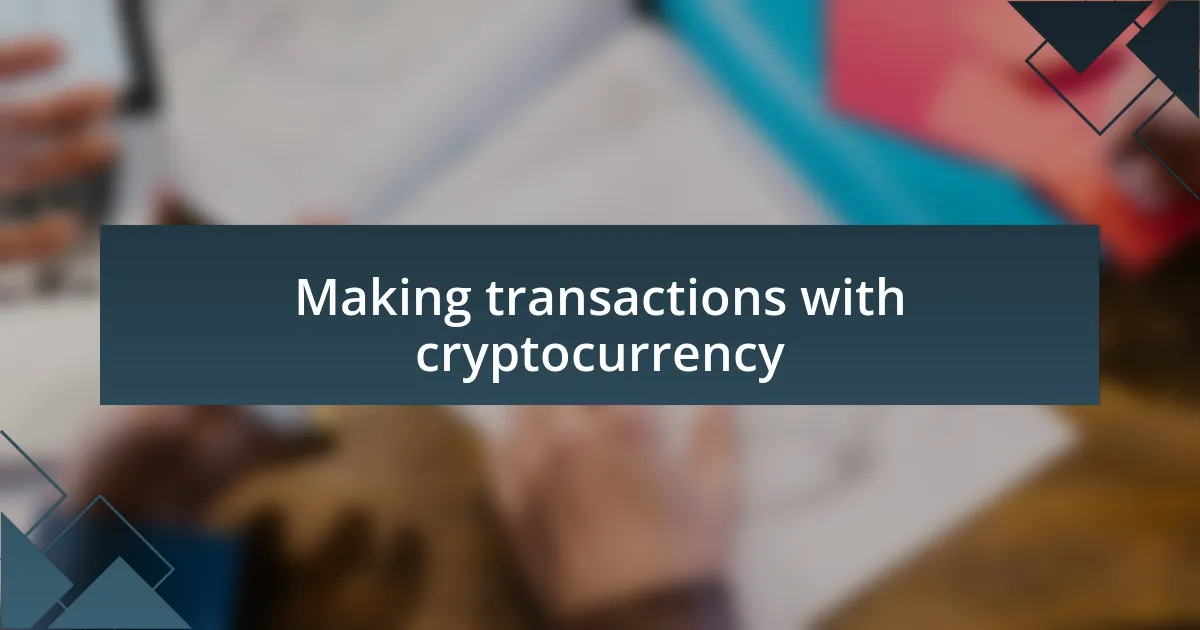
Making transactions with cryptocurrency
Making transactions with cryptocurrency can be a straightforward yet exhilarating experience. I vividly recall my first purchase using Bitcoin; the sense of empowerment I felt was palpable. Navigating through the wallet interface, I was pleasantly surprised at how quickly I could transfer funds. Have you ever found yourself amazed by technology? I certainly did in that moment; it felt like I was part of something groundbreaking.
Once I became more familiar with the process, I appreciated the transparency that cryptocurrency transactions offer. Each transaction is recorded on the blockchain, allowing me to track everything with remarkable clarity. One time, when a transaction I made took longer than usual to confirm, I discovered how to check its status directly on the blockchain. It transformed a potentially frustrating situation into an opportunity to learn about the technology’s workings. How often do you get to see exactly where your money is at any given moment?
It’s essential to remember the importance of security when making transactions. For example, I always double-check addresses before sending funds, as I learned the hard way how a minor error can lead to irreversible losses. Have you ever made a mistake and felt that sinking feeling in your stomach? I certainly have, and it taught me to be meticulous. Ensuring that your wallet and transactions are secure makes all the difference, allowing you to navigate this thrilling space with confidence.
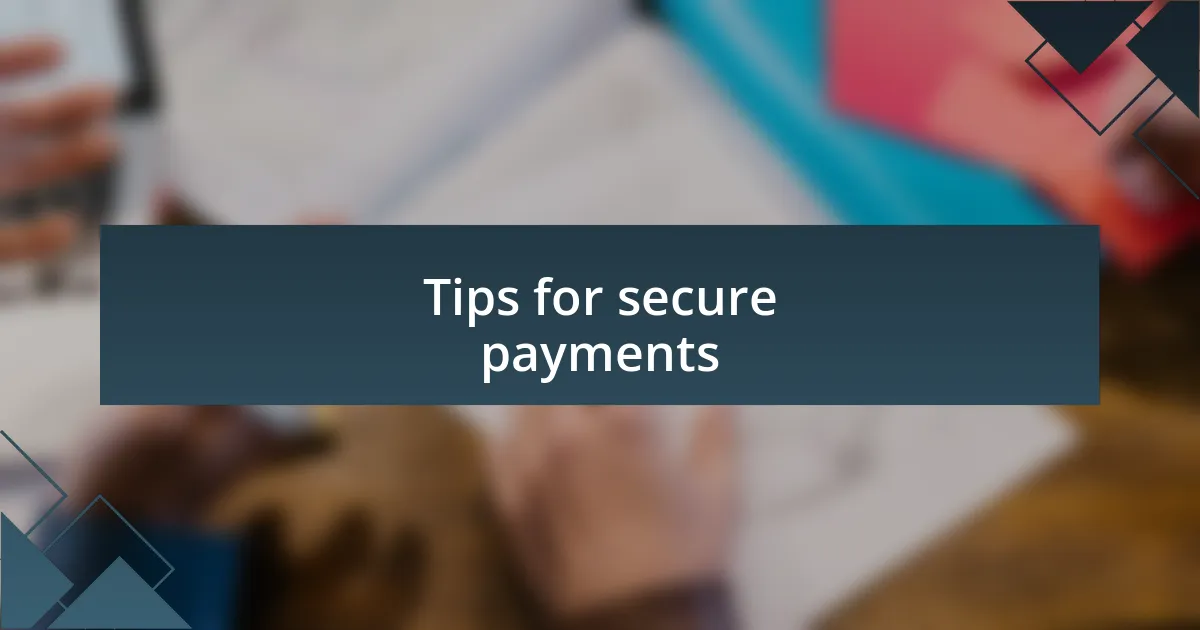
Tips for secure payments
When it comes to securing your cryptocurrency payments, one of the most effective strategies is enabling two-factor authentication (2FA) on your wallet and accounts. I remember the relief I felt when I set this up; it added an extra layer of protection that made me feel much safer. Just think about it—if someone were to gain access to your password, wouldn’t you want that additional barrier to keep them from your funds?
Another tip I often recommend is to use hardware wallets for storing significant amounts of cryptocurrency. I made the transition a while back, and I can’t stress enough how much peace of mind it brought me. Instead of keeping my assets on exchanges (which are frequent targets for hackers), I now have them stored offline, making them nearly immune to online threats. Have you ever considered how easily you could lose access to your funds if they reside solely on an exchange?
Lastly, always be wary of phishing attempts. I once clicked on a link in an email, believing it to be a legitimate update from my exchange, only to realize later that it was a scam. It left me feeling vulnerable and reminded me how crucial it is to verify the source of any communication. Before entering sensitive information, I now take a moment to pause and ensure that I’m on the correct site, because a small oversight could lead to significant consequences. Isn’t it worth a minute of caution to protect your investments?
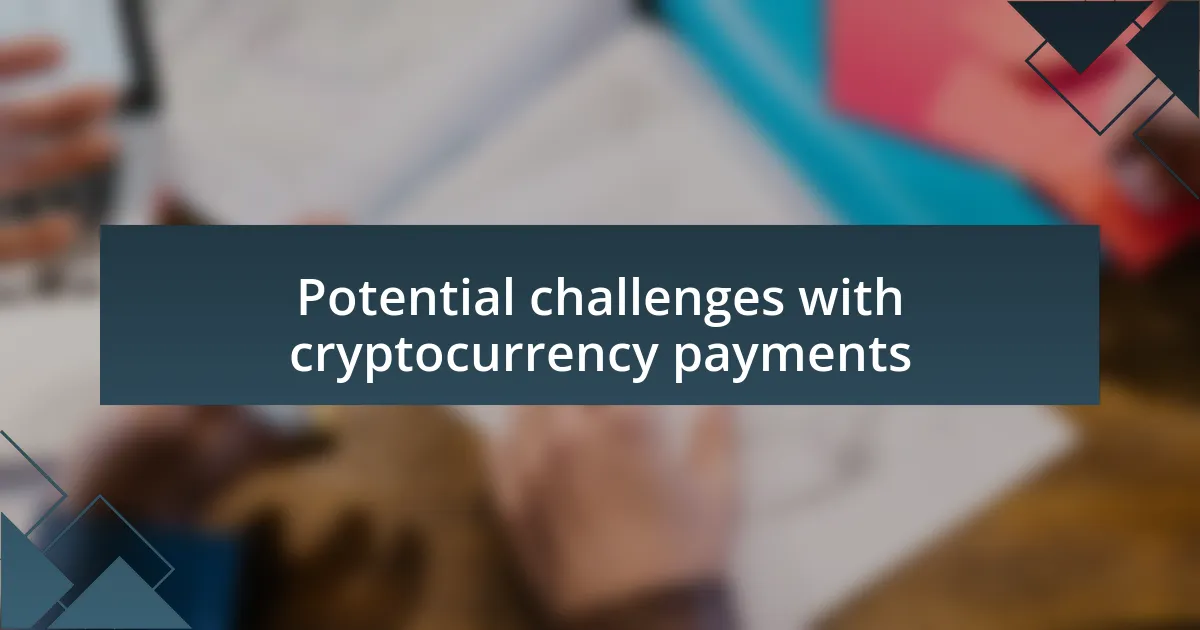
Potential challenges with cryptocurrency payments
When I first started accepting cryptocurrency payments, I was excited but quickly realized the volatility could be a real challenge. I remember one transaction where the value of Bitcoin dropped significantly between the time the customer initiated the payment and when I confirmed it. It was unsettling to think that my earnings could fluctuate so unpredictably; it made me wonder how businesses manage their pricing in such a landscape.
Another hurdle I encountered was the complexity of the technology itself. Setting up and understanding wallets, keys, and various platforms can feel overwhelming for someone just getting started. I often asked myself if this was worth the effort, especially when I saw friends who preferred traditional payment methods that seemed so much simpler. The time I spent learning the ins and outs of cryptocurrency felt daunting, but reflecting on my current experience, I realize it has empowered me.
Moreover, regulatory uncertainty looms over cryptocurrency payments. There are still many gray areas in terms of compliance and taxation, and I found myself stressing about potential legal implications. I once attended a workshop where the speaker mentioned how tax laws regarding cryptocurrency can vary not just by country, but sometimes even by state. That made me think: How could I be sure I was operating within the legal framework? This uncertainty can create anxiety for business owners and consumers alike, as we navigate an evolving set of rules in the crypto space.








